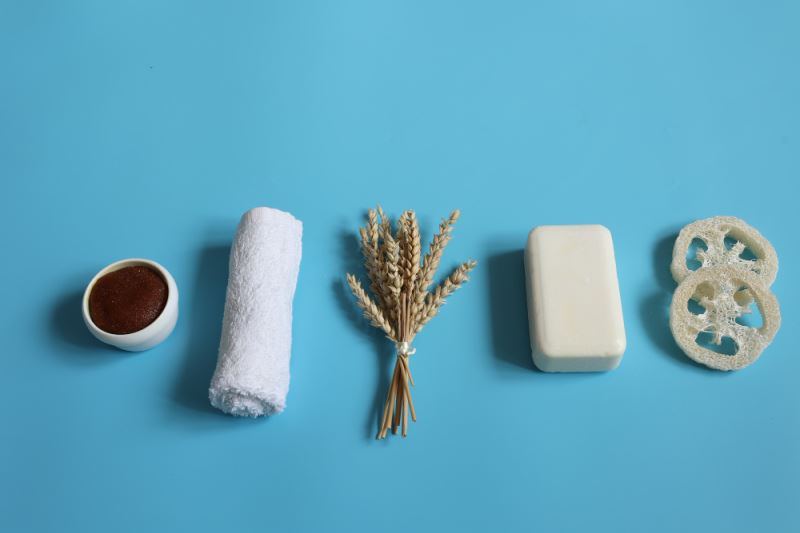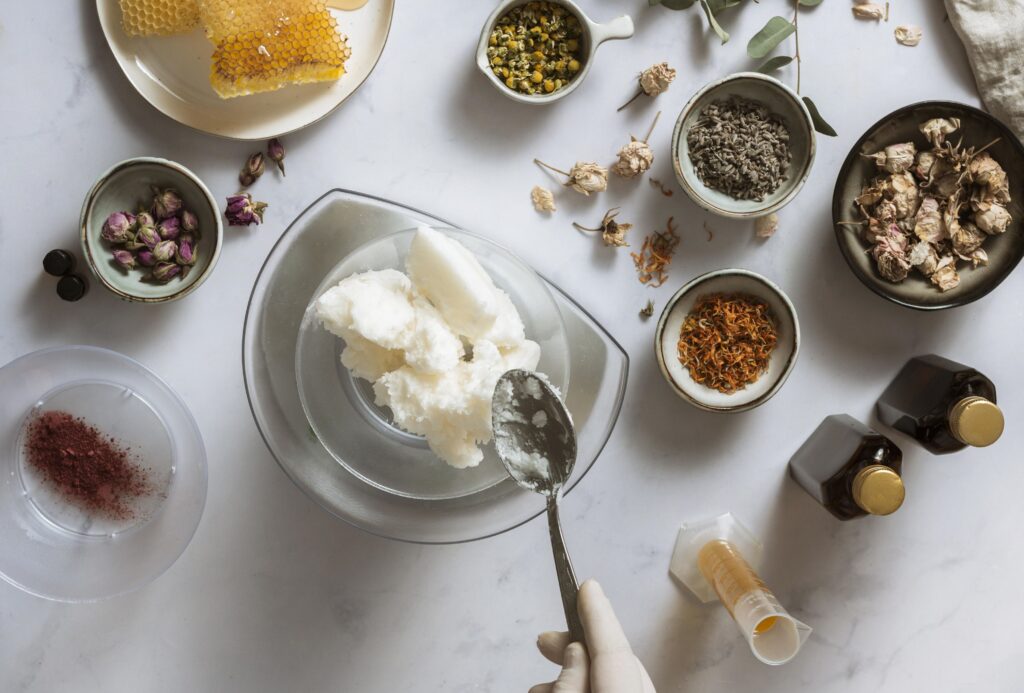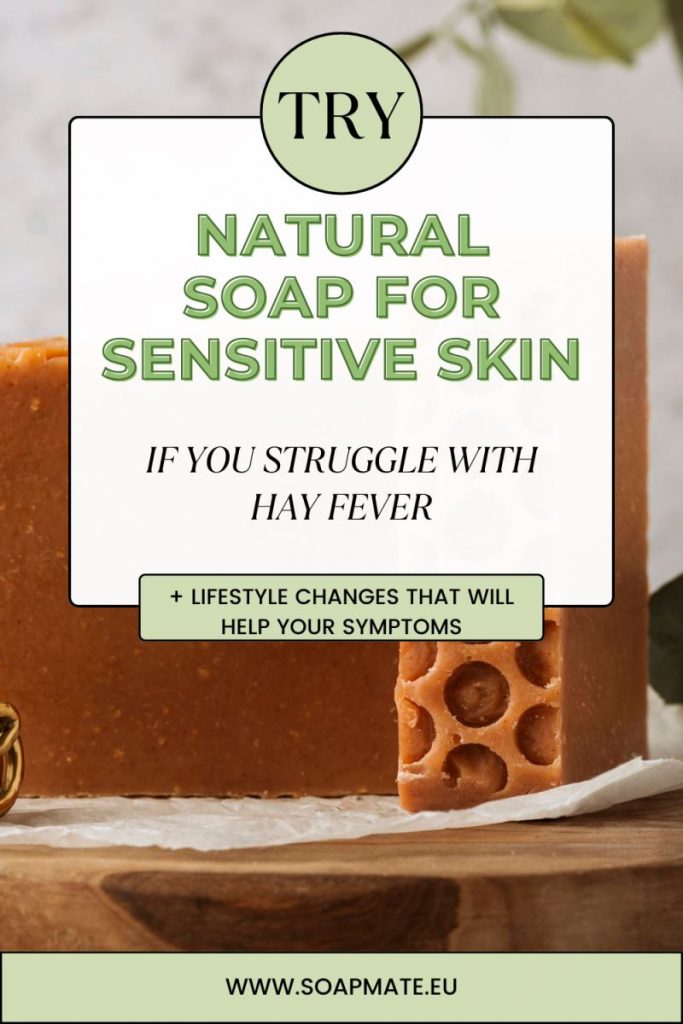Natural Soap For Sensitive Skin To Relief Hay Fever Symptoms: How To Implement?
Spring is a beautiful season, but for those with sensitive skin or allergies, it can be a challenging time of year. As flowers bloom and pollen fills the air, many of us experience symptoms like sneezing, itchy skin, and irritation. For example, my boyfriend has struggled with hay fever for years, and through trial and error, we have discovered that incorporating natural skincare, particularly gentle and allergen-free natural soap for sensitive skin, can make a significant difference.
If you have allergy-prone skin or suffer from seasonal allergies, choosing the right soap can help soothe your skin and prevent further irritation. In this article, I will share the best types of natural soap for sensitive skin, along with tips on creating a holistic, natural skincare routine for spring.

How Spring Allergies Affect Your Skin
Many people associate seasonal allergies with sneezing and watery eyes, but they can also affect the skin. Pollen, dust, and other allergens can trigger dryness, and itchiness, especially for those with sensitive skin. When my boyfriend's hay fever symptoms worsened, he also started experiencing dry patches on his skin, which led us to reassess our entire skincare routine. Switching to a hypoallergenic natural soap for sensitive skin made a noticeable difference. If you are prone to eczema, rosacea, or general skin irritation, using a mild and nourishing soap is essential to keep your skin barrier healthy during allergy season.
Skin that is already prone to irritation can become even more sensitive when exposed to seasonal allergens. Histamines released in response to pollen can cause inflammation, leading to redness and flare-ups. This is why it’s essential to protect your skin with gentle, nourishing products that won’t exacerbate these issues. Washing your face and body with the right natural soap for sensitive skin can help reduce exposure to allergens while also keeping your skin hydrated and balanced.
Beyond skincare, we also made other changes to reduce exposure to allergens. For example, we started keeping windows closed during peak pollen times and changing pillowcases frequently to prevent pollen buildup. Additionally, he began rinsing his face and especially the eyes with cool water after spending time outside to remove any lingering allergens.

What to Look for in a Natural Soap for Sensitive Skin?
I always like to say that not all soaps are created equal. Some contain harsh chemicals, synthetic fragrances, and preservatives that can exacerbate skin issues. Artificial fragrances are known to be common skin irritants, often triggering reactions in those with allergies or sensitivities. To avoid unnecessary irritation, I've found it’s best to opt for soaps that are either fragrance-free or naturally scented only with essential oils. Ingredients like chamomile, calendula, or lavender not only provide a gentle, natural aroma but also have soothing and calming properties that can benefit sensitive skin.
For instance, our natural calendula soap contains only natural plant-based raw ingredients such as coconut oil, olive oil, shea butter and castor oil. Take for instance olive oil and shea butter - they are hypoallergenic ingredients which help prevent moisture loss. We also use infused calendula extract that takes care of the skin in a gentle way and soothes irritated skin. All these ingredients are gentle yet effective, ensuring that the skin stays hydrated and soothed throughout allergy season (and any season in general).
In order to limit hay fever symptoms, it’s also crucial to avoid harsh surfactants like sulfates (such as SLS and SLES), which can strip the skin of its natural oils and worsen irritation. Instead, opting for a natural soap for sensitive skin made with mild cleansing agents derived from coconut or other plant-based sources can work wonders. Natural antioxidants like honey, green tea, or aloe vera can also be incredibly beneficial, as they help combat inflammation caused by allergens and environmental stressors.
One of my personal favorites is our cold-processed olive oil soap with calendula extract. It’s gentle, moisturizing, and free of common allergens, making it perfect for daily use during spring. Additionally, avoiding dyes and unnecessary additives in soap can further minimize irritation.

Natural Ingredients That Help Soothe Allergy-Prone Skin
Beyond choosing the right soap, incorporating soothing and anti-inflammatory ingredients into your skincare routine can work wonders. Oatmeal is an excellent natural remedy for reducing itchiness and irritation, making it ideal for soothing allergy-induced skin flare-ups. I've talked about it also in my article on ways to help dogs with irritated skin. It helps to create a protective barrier over the skin, locking in moisture and preventing further damage from allergens.
Aloe vera is another powerful ingredient known for its natural anti-inflammatory properties. It provides deep hydration and instant relief from redness and irritation, making it an essential part of any allergy-friendly skincare routine. Applying fresh aloe gel or using soaps infused with aloe can keep the skin calm and comfortable.
Another hidden gem has been using local honey - it has been a game-changer for us. As a dedicated beekeeper, my boyfriend started incorporating it into his diet and skincare routine, and we noticed a reduction in his hay fever symptoms. Eating a few teaspoons of delicious, handmade and locally produced honey turned to be a natural support in fighting allergy symptoms, mainly because it acts as an antidot. Honey has antibacterial and soothing properties that help protect sensitive skin while also strengthening its resilience against environmental allergens.
Calendula is another fantastic ingredient for allergy-prone skin. Known for its gentle and healing properties, calendula extract can help calm inflamed skin and promote faster healing of minor irritations. Coconut oil is also a great addition, offering deep hydration and containing anti-inflammatory compounds that support the skin’s natural barrier against allergens.
Green tea extract, rich in antioxidants, helps fight free radicals and reduce redness caused by allergens. Using a soap infused with green tea can provide an extra layer of protection against seasonal skin stressors. Jojoba oil, with its similarity to the skin’s natural sebum, is another excellent choice for moisturizing without clogging pores.

Best Types of Natural Soap for Sensitive Skin in Spring
If you’re not sure where to start, here are some of the best types of natural soap for sensitive skin that work well for allergy-prone and sensitive skin:
Number one is (surprise, surprise) of course, the castile soap - made with olive oil, it is one of the mildest and most nourishing options available. It provides a gentle cleanse without stripping the skin of its natural oils, making it ideal for those with allergies or sensitive skin. Another option, which I personally haven't tried but have heard wonderful feedback about, is goat milk soap, as it is rich in fatty acids and vitamins that help soothe and repair dry, irritated skin. The natural lactic acid in goat milk also promotes gentle exfoliation, helping to remove allergens that may have settled on the skin’s surface.
Then again, we have the oatmeal soap as a classic go-to for people with allergies, as it helps to reduce itchiness and inflammation caused by pollen and other allergens. Its natural soothing properties make it a must-have during allergy season. Next to that is the aloe vera soap which provides deep hydration while calming sensitive skin. If your skin tends to become red and irritated due to allergens, this is an excellent option.
Chamomile soap, which is infused with chamomile extract, is well known for its anti-inflammatory and calming effects. It helps to reduce redness and irritation, making it a perfect choice for those dealing with allergy-induced skin sensitivities. Shea butter soap offers deep hydration and creates a protective barrier against allergens. It helps to lock in moisture and soothe dry, irritated skin, making it a great addition to a spring skincare routine.

Creating an Allergy-Friendly Skincare Routine
While switching to a natural soap for sensitive skin is a great start, there are other ways to ensure your skin stays healthy and resilient during allergy season. Washing your face and hands regularly is crucial, as pollen can stick to your skin and hair, exacerbating allergy symptoms. Cleansing with a gentle, natural soap for sensitive skin can help remove allergens and prevent further irritation.
Taking lukewarm showers rather than hot ones can help preserve the skin’s natural oils and prevent excessive dryness. Incorporating a soothing face mist made with chamomile or rose water can also provide instant relief for inflamed skin. Just make sure you are not allergic to any of the ingredients. For example, my skin gets very dry from rose water, whereas my best friend swears by its benefits!
Using a humidifier at night can help maintain moisture levels in the skin and prevent dryness caused by indoor heating or air conditioning. Staying hydrated by drinking plenty of water also helps flush out allergens and supports overall skin health.
Final Thoughts: Embracing Natural Skincare for Spring Allergies
If you or someone you love suffers from seasonal allergies, making small but meaningful changes to your skincare routine can make a world of difference. Through our own journey, my boyfriend and I have found that embracing natural skincare not only helps with allergy symptoms but also fosters a greater connection to sustainability and eco-friendly living. Choosing the right soap and skincare routine can help you enjoy spring to the fullest - without the irritation!

This article was all about discovering how natural soap for sensitive skin can be a contribution to relieving your hay fever symptoms. I hope the advice here will inspire you to try implementing natural ingredients to your skincare routine and your lifestyle, such as natural soap for sensitive skin and local honey products. Let me know if you have already tried that and how fast did you see an improvement!
